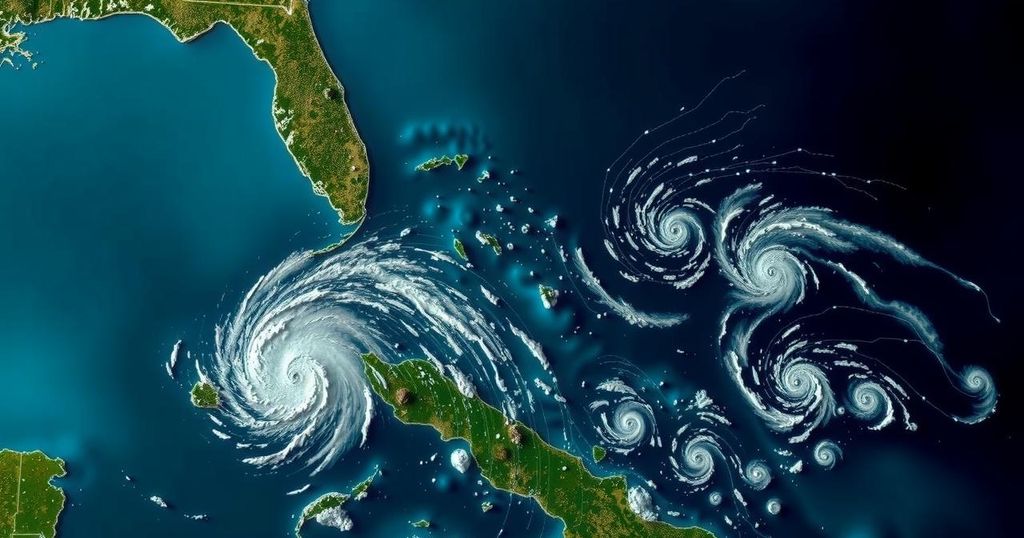The 2024 Atlantic hurricane season was characterized by historic storm activity, featuring multiple Category 5 hurricanes, resulting in $191 billion in damages. Notable storms included Hurricane Beryl, Debby, Francine, Helene, and Milton. Despite a slow start, activity surged in late September, making this season one of the costliest and most impactful in history.
The 2024 Atlantic hurricane season concluded with remarkable activity, characterized by unprecedented storm patterns and record-setting impacts. This season marked the first occurrence of multiple Category 5 hurricanes since 2019 and became one of the most financially burdensome on record, tallying damages amounting to $191 billion. Across the Atlantic basin, 18 named storms formed, with 11 achieving hurricane status including 5 major hurricanes – predominantly impacting the United States with 8 hurricanes making landfall, five of which directly struck the U.S. mainland.
Beginning its formal onset with Tropical Storm Alberto on June 19, the season initiated with the slowest start in ten years. Nevertheless, it marked the ninth consecutive season of above-average activity within the Atlantic basin, which customarily yields 14 named storms. Notable storms included Hurricane Beryl, the earliest recorded Category-5 hurricane, which wrought significant damage, notably storm surge flooding, in Texas and Louisiana. In August, Hurricane Debby made landfall in Florida, causing extensive flooding and power outages across the southeastern states.
Hurricane Francine made a powerful impact in Louisiana, while Hurricane Helene landed in Florida as a Category 4 storm, leading to historic storm surge levels across affected areas and catastrophic inland flooding reminiscent of Hurricane Katrina. Furthermore, Hurricane Milton emerged as the season’s strongest storm, previously underestimating its severity by forecasters until it proved to be the costliest storm of the year in the Atlantic.
Despite an initial lull in activity during the season, several strong storms, including Gordon, Isaac, and the momentous Hurricane Kirk, significantly revitalized the latter half of the season. Among unique occurrences, Hurricane Oscar recorded the smallest hurricane-force wind field on record, while Hurricane Rafael represented the most robust November hurricane in nearly four decades. All these factors contributed to making the 2024 season historic, with ongoing discussions regarding the environmental conditions that fueled such volatility across the Atlantic.
The 2024 Atlantic hurricane season was marked by an increase in tropical activity, influenced by above-average sea surface temperatures and neutral atmospheric conditions described by the El Niño-Southern Oscillation (ENSO). Meteorological patterns suggested an active season with predictions estimating a total of 17-24 named storms, against the climatological average. The season showcased multiple historic hurricanes, including the emergence of Category 5 storms and significant impacts across the southern United States, leading to considerable humanitarian and economic repercussions.
In summary, the 2024 Atlantic hurricane season will be remembered for its unprecedented intensity and the severe toll it took on communities, infrastructure, and economies across affected regions. The emergence of record-breaking storms against a backdrop of changing climatic conditions illustrates the critical need for ongoing preparedness and adaptation strategies. As trends indicate increasing hurricane activity, understanding these patterns becomes paramount for future resilience against such natural disasters.
Original Source: www.wmnf.org







